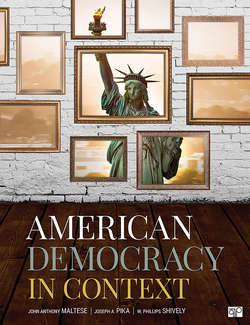Читать книгу American Democracy in Context - Joseph A. Pika - Страница 115
На сайте Литреса книга снята с продажи.
The New Deal and the Rise of Cooperative Federalism
ОглавлениеThe stock market crash of 1929 and the ensuing Great Depression transformed politics in the United States. The Republican Party had dominated national politics since the Civil War, but the Depression led to a partisan realignment—a lasting shift in voters’ partisan identification. Republicans, who had controlled the White House and maintained solid control of both houses of Congress since 1921, lost control of all three branches of government in the 1932 elections when Franklin Delano Roosevelt (FDR) won the White House and fellow Democrats took control of the House and the Senate. In contrast, the Supreme Court—given the lifetime tenure of its members—remained unchanged, standing as a dual federalist obstacle to Roosevelt’s New Deal.
